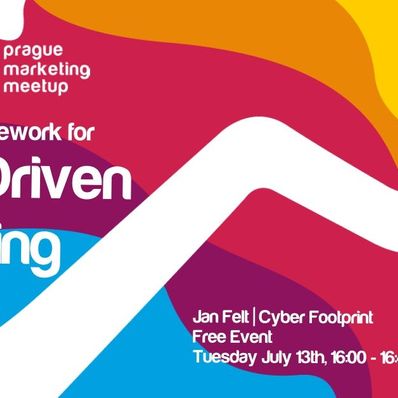Marketing: Luck and Money
TL;DR version: marketing activities create more positive outcomes for your brand, if you let marketers do things that do not produce positive ROI immediately.
When you hear that 70-80% of any given marketing budget gets wasted, which of the following reactions is correct?
A) That's because the marketers aren't spending enough money online where it's all quantifiable.
B) Using market research, big data and attribution modelling I can bring that down to 20-25%.
C) So what? Marketing works in mysterious ways.
Let's apply the most important rule you were taught in high school. When in doubt, always pick the option 'C'.
That 70-80% of the marketing budget isn't wasted; it's merely unquantifiable. There's a difference.

Business people create mathematical models to evaluate their marketing efforts. Most of those models are inaccurate at best, because they don't take human nature into account. They can't because it's far too complex. However, business people would rather have a wrong model than no model. Whatever doesn't fit into those narrow models gets labelled as superfluous and ends up discarded.
By focusing only on the quantifiable, you severely limit what advertising can do for your brand. Rory Sutherland explains it best: "you end up doing what you can prove, not doing what works." 1)
To understand what works, one needs to understand obliquity.
Obliquity: Fame and Luck
According to Sir James Black, "in business as in science, it seems that you are often most successful in achieving something when you are trying to do something else." I consider this one of the best definitions of obliquity. Frank Ramspott makes this definition slightly digestible: “being too direct or systematic is often not the optimum approach to things – and, in fact, can sometimes be the root cause of failure.” 2)
Sometimes it’s better to be adaptive than systematic and process-orientated.
Let's say you are a marketer for a B2B company. Your job is to find and deliver leads to the sales department.
It's Wednesday evening and you have a choice between two activities ‒ either go to a networking event or enjoy a quiet evening at home.
If you go to the networking event, you are instinctively improving your chances of something good happening to you. You might make a new friend, discover a new business contact or learn about the latest news from your field of expertise. By not staying at home, you maximise your chances of stumbling upon an interesting opportunity.
Benefits of attending the networking event are very difficult to attribute and quantify. If you attend, lucky things might happen to you. If you don't, nothing happens. Try writing a business case for your attendance; it's untenable.
Just as being obscure makes you lose out on opportunities, being well-known has its perks. Other CXOs will take and return your calls, employees will work for less money, vendors will give you better rates, you get more partnership propositions and so on. The best side effect of exposure is being top-of-mind for your prospects and customers. That increases your chances of being lucky, which will translate into more leads and higher profits.
Enjoying this article? Subscribe to our monthly newsletter for more.
No spam, no annoying sales pitches.
Businesses are great at quantifying costs, but dismal at quantifying opportunities. Let's flip this around when thinking about marketing. We ought to stop thinking in terms of "what benefits do we get if we do X?". Instead, we should think in terms of "what opportunities are we losing if we don't do X?".
Practical Use of Obliquity
Rory Sutherland argues 3) that we should stop pretending that marketing is logical and that it follows basic tenets of economic theory. Marketing favours solving problems of perception instead of problems of reality. That's its greatest strength.
Let me elaborate.
There are some areas of business where it pays to be as rational and logical as possible. Operations, finance or logistics departments are ruled by best practice, efficiency and economies of scale.
However, there are some areas in which conventional logic and rationality make no sense. They are closer to military strategy than to economic optimisation. In conventional business scenarios, people try to be efficient and reach economic equilibria, because they yield the best pay-off. They do so by making tried and trusted moves, thereby becoming predictable.
In military strategy, this is something you want to avoid. Predictability allows your enemy to set a trap for you and vanquish your forces. “Make a false move, not to pass it for a genuine one but to transform it into a genuine one after the enemy has been convinced of its falsity.” 4) I think this is one of the quotes that captures the spirit of military strategy. It doesn't really put the "fair" in "warfare", does it?
This is very applicable to today’s business. Take marketing or Human Resources. In HR, your aim is to find underrated people that your competition hasn’t found yet or doesn’t consider to be valuable. If that’s not guerilla warfare, I don’t know what is.
In marketing as in HR, your mission is to vie for customer's attention in a saturated world. In both cases, your best bet is not to rely on conventional logic, because your competitors are already doing it. If your competitor is an incumbent, challenging him using conventional means will be an expensive endeavour. Just look at the evolution of CPC and CPM prices in social ads. 5) Does that remind anyone of war of manoeuvre?
Really good marketers and agencies can save organisations tonnes of money by finding counter-intuitive solutions to conventional problems. Again, here’s Rory Sutherland and his rule of alchemy: “If there was a logical answer, we would have already found it.” 3)
Red Bull
Imagine your board of directors tasked you with creating a soft drink that's going to compete with Coke. If you want to get your approved, suggest the product should be cheaper than Coke, taste as well as Coke or better and should come in a really big can. Nobody in their right mind would suggest that the best way to compete with Coke is to create a concoction that tastes revolting, costs more money and comes in a smaller can than Coke. 3)
Back to reality. Red Bull is the most successful competitor of Coca-Cola. It's success is a triumph of counter-intuitive perspective on the whole soft drinks category. It's also a happy accident.
When marketers are left to solve problems of perception, fruits of their labour will come from the most unexpected of places. Positive ROI isn't everything.
Do you want to approach marketing problems obliquely? We can help.
Response within 24 hours guaranteed.
References
1) "Rory Sutherland Presents Behavioural Science for B2B." YouTube, uploaded by Jennifer Shaw-Sweet, 4 Aug 2020.
2) Price, Rhiannon. "Why 'Obliquity' Leads to More Impactful Market Research: Opinion." Research Live, 1 May 2014.
3) Sutherland, Rory. ALCHEMY: The Surprising Power of Ideas That Don't Make Sense. W H ALLEN, 2020.
4) Wu, Sun. The Wiles of War: 36 Military Strategies from Ancient China. Translated by Sun Hai Chen, Foreign Languages Press, 2009.
5) O'Neill, Shane. "Q3 Facebook Advertising Benchmarks: Video, Dynamic Ads See Continued Growth." Nanigans, 14 Oct. 2019.
Image Credit: Yan Ming

Managing Director
Honza Felt is a performance marketing specialist who turned into a marketing consultant after a mysterious accident. He spends his days leading a bunch of misfits at CF Agency. Drinks rum and knows things.


